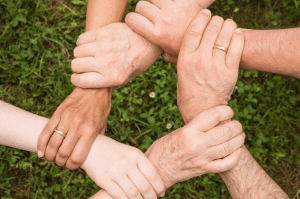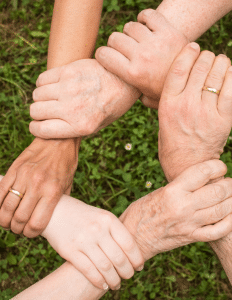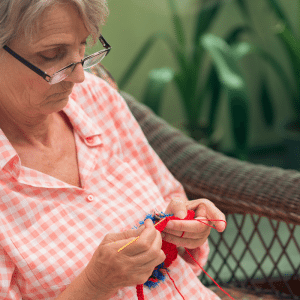5 Tips To Help You Make New Friends
Aging comes with many difficult challenges. Meeting those challenges often requires that new skills be learned in order to adapt and survive. A hip replacement requires that you learn a new way to sit. A decision to stop driving may mean that you need to learn to use public transportation of some kind. So, it should come with no surprise that you may need to acquire new skills in socializing in new situations, too.
It is usually true that as we get older than most of our peers, many of our close friends, and even our acquaintances have not made it as long as we have in life. It’s a very challenging problem to have. On one hand, it makes us sad to lose so many people who have the same memories that we have, the people we’ve shared our lives with. On the other hand, if we are only to focus on what we’ve lost, we ourselves will shrivel up and lose the hope that’s necessary to move forward in our lives. One of the new skills we’ll need to acquire to adapt to this new way of life is making new friends. If you’re not a naturally extroverted person, it may have been several years (or even decades) since you’ve had to put a lot of effort into making new connections.
If you haven’t tried making friends for some time, here are a few tips to get you started.
- Be friendly. Some of us have forgotten what it’s like to ask how another person’s day is going. Ask about family, grand-children, or whether they’re feeling okay in the excessive heat. A little friendliness can go a long way toward opening discussion.
- Find new places to socialize. If you are not finding what you need in the places you currently frequent, try other spots. Try a hobby club, a book club, or even take a stroll at a farmer’s market. Go to an event you wouldn’t normally go to at church or in your community. Interacting in new places will naturally introduce you to new people.
- Reach out. If there are people that need help in your community, see if you can fill the need. Cancer patients receiving treatments and sitting for hours might be in need of visitation. Join a group that makes mats for the homeless or quilts for the struggling or refugees. Even food banks can use help. Even if you cannot do heavy lifting, you can help by organizing food drives and advertising them.
- Practice conversation. Sometimes our skills need to be honed on a more technical level. We may be stuck in a rut of asking yes/no questions. Practice asking open-ended conversations. Normally you might say, “Did you have a nice time with your children this weekend?” Think about how you might rephrase that sentence. Consider asking, “What was your favorite part about your time with your children?” You can start practicing when you’re by yourself. Think about what questions you’d like someone else to ask you about. Are there parts of your life that you’d love to share with others, but that no one asks you about? If your career was important to you as a younger person, ask about what another person did for work in their younger years. Practice not only how to start conversations, but also how to think of creative ways to continue them using open-ended questions. While you’re watching a program on TV, pause it and re-word direct yes/no questions in more meaningful ways. Think about how much more you will learn about people when you do this.
- Stay in touch. Once you’ve made contact with someone that seems promising and like you might like to continue the relationship, make an effort to stay in contact. Ask for their phone number or plan to get together again. Most of the time, these things require a bit of scheduling energy, since our society is very over-scheduled. It is worth the effort, however, especially if you both sense that there might be a relational benefit.
Making new friends is not rocket science, but it does take tremendous effort. You will find people along the way who do not suit you, or you them. Do not be discouraged by that. You will find people who do not have time to devote to another relationship. Do not let that worry you. Those that you find that have potential will be that much sweeter when you find them. This thing that you are after, friendship, is worth much effort. Friendships can help to stave off loneliness and can improve your health and well-being. It is well worth any amount of time and energy that you put into it.
“Ten minutes with a genuine friend is worth years spent with anyone else.” Crystal Woods


 Some people say blood is thicker than water. Family is important, that much is certain. One thing about family, however, is that it cannot be chosen. You are born or adopted into a family, it is not your choice. With family, it is chosen for you & it is an amazing thing, but even more astounding is when you can make choices regarding with whom you’d like to spend your time. Some people use the word “friend” loosely. They use the term to describe any acquaintance with whom they come into contact. Real friendships, however, are those that are intentional & in which you invest your time and energy. Your meeting may be coincidental, but a long-lasting friendship will need more than a chance meeting. It will require time, care and consideration in order to grow.
Some people say blood is thicker than water. Family is important, that much is certain. One thing about family, however, is that it cannot be chosen. You are born or adopted into a family, it is not your choice. With family, it is chosen for you & it is an amazing thing, but even more astounding is when you can make choices regarding with whom you’d like to spend your time. Some people use the word “friend” loosely. They use the term to describe any acquaintance with whom they come into contact. Real friendships, however, are those that are intentional & in which you invest your time and energy. Your meeting may be coincidental, but a long-lasting friendship will need more than a chance meeting. It will require time, care and consideration in order to grow.

